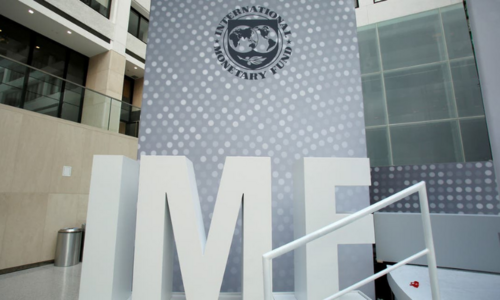DESPITE having progressed to ‘very good step’ and being ‘close to concluding the agreement’ a few days back, the talks between Pakistan and the IMF for the resumption of the $6bn programme seem to have hit a deadlock.
Pakistan’s entire finance team that had been negotiating the revival of the loan facility in Washington since early this month has had no option but to leave without finalising an arrangement that is considered crucial to mitigating the emerging risks to our balance of payments. Yet a finance ministry spokesman has dismissed reports of a breakdown in talks, insisting that these were continuing and a statement would be issued as soon as discussions concluded. Earlier, he had refused to give a definite time frame for the agreement.
The reasons for the ‘failure’ remain unclear but the IMF is expected to soon issue a statement to explain how its reforms programme can be revived. However, reports suggest that the talks had hit a snag on a number of matters including disagreement on the level of increase in electricity prices, imposition of additional taxes of approximately 1pc of GDP, and validation of the expenditure of the $1.4bn Covid funds provided to Islamabad to fight the pandemic. With neither side coming clean on the reasons for the current ‘interruption’, it can only be hoped that this hiatus in talks will be temporary.
From the very start, the Fund was expected to play hard this time around given the government’s poor track record on implementation of the steps agreed to under the programme to reduce expenditure, raise the tax-to-GDP ratio, liquidate the energy sector debt, and reform or privatise loss-making SOEs. The talks were projected to be tougher given the changed regional geopolitics after the Taliban takeover and the new frostiness in Pakistan’s ties with Washington, which has huge influence over the Fund.
Yet finance adviser Shaukat Tarin was hopeful of convincing the lender about meeting programme targets without taking its suggested harsh measures ahead of the 2023 elections. Apparently, the IMF has proved him wrong.
The question now is whether Islamabad has any fallback plan as the State Bank’s liquid foreign exchange reserves have already begun depleting on the rising trade deficit, putting pressure on the exchange rate. Indications are it doesn’t have one unless the Saudis agree to step in to fill in for the IMF and help Islamabad avert the imminent balance-of-payments crisis and its attendant consequences.
Published in Dawn, October 25th, 2021














































